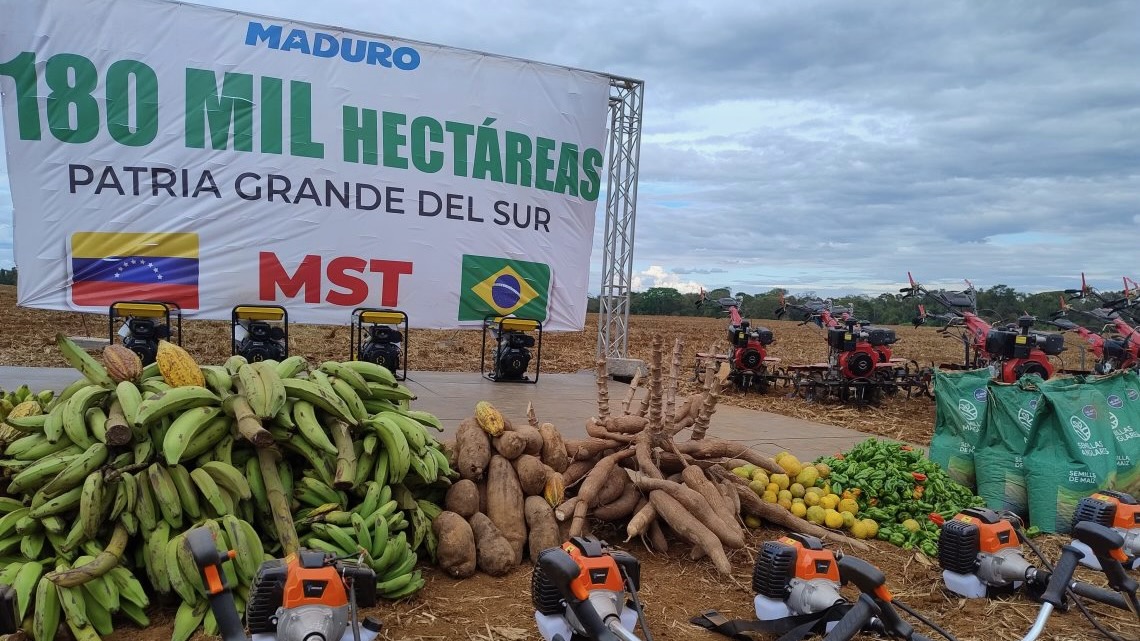
By Lorenzo Santiago
From People’s Dispatch
Members of Brazil’s Landless Rural Workers’ Movement (MST) have been working shoulder to shoulder with peasants in Venezuela for the last several months on a project to expand food production in the country. The Pátria Grande do Sul (the Great Homeland of the South) project in Vergareña, Bolívar, was announced by Venezuelan President Nicolás Maduro in September 2024 and seeks to develop 180,000 hectares for food production.
In addition to providing healthy food and ensuring the population’s access to quality products, one of the government’s intentions is to achieve food sovereignty in the country. According to the Venezuelan government, the country used to import 85% of the food consumed locally. When the US government imposed a regime of sanctions on the Venezuelan oil sector and restricted it from financial markets in 2017-2019 (most of which continue till today), food imports decreased drastically. Without local food production to supplant supply, the country faced serious food shortages. The devastating economic crisis was not only an indictment of the humanitarian toll of US policy on the country, but also served as a wake-up call to reorient the Venezuelan economy to use not just its oil wealth, but its vast arable land to strengthen its self-sufficiency in an era of intensified US attacks.
Building off 20 years of MST’s work in Venezuela through brigades and exchanges, as well as its 40 years in Brazil organizing landless families to occupy vacant land and kick start food production, the Venezuelan government asked Brazil’s MST for support in coordinating the project in Vergareña.
Agroecology: a project for transformation
After a thorough analysis of the territory by the Ministry of Agriculture, the MST identified locations for the plots of land for each food item, defined the spaces in which the families would live, and began preparing for people to arrive. Among the crops they will produce are beans, fruit, papaya, sugar cane, yams, vegetables, and corn, as well as chicken, pork, beef and its derivatives. The MST is also preparing to produce a bank of traditional native seeds and a nursery for reforestation.
The Venezuelan president said in September that this is a way to change the country’s productive structure and create a new economic model that has the commune – politically and economically self-managed collectives – as the central focus of production.
“The largest project led by the peasant movement using agroecological methods on a large scale for our people in Venezuela, Brazil and the world. One of the most important rescues that has ever taken place. We have made progress and we will activate all production plans. The priorities are to produce, supply, and export,” he said.
The coordinator of the MST brigade in Venezuela, Rosana Fernandes, said that the project is an agroecological production model, involving political and technical training. According to her, the project demonstrates the MST’s commitment to the Bolivarian revolution.
“We have a lot of experience and we want to contribute in solidarity with the Venezuelan people to strengthen their sovereignty. The MST reaffirms the principle of solidarity and internationalism when we carry out these acts in this territory; concretizing and showing the accumulated achievements of the struggle to make the land our territory and build a different project for society: socialism, in which we believe. The revolution of the Great Homeland is built like this: we will make Latin America a homeland free of agribusiness,” Fernandes said.
She also stated that the presence of the MST in Venezuela represents an exchange of experiences and knowledge, in which the movement brings its technical and political background and, at the same time, learns about “building popular power” from the commune model.
Setting up the camp
The first step in occupying the space is to set up the camp where the families will settle. The model is similar to the one organized by the movement in Brazil, but there are some important differences in relation to the way the process was carried out. The first of these concerns the acquisition of the land.
Unlike what happens in Brazil, the MST did not need to study unproductive land belonging to a large estate or a large producer. The land already belonged to the Venezuelan government and the study of the area was carried out by the Ministry of Agriculture itself. For Gessica Lima dos Santos, an agroecology technician and a coordinator of the project in Venezuela, this accelerated a process that, in Brazil, would have required not only time, but also a struggle in compliance with the Constitution.
“Here we have something that would take 30, 40 years to achieve in Brazil. We already have the land. We have already conquered the territory and we have all the tools necessary to create the camp provided by the government itself. But not in Brazil. In Brazil we would still have to understand the territory, study it and even then we would still have conflicts with the landowners themselves and it would take a very long process of struggle,” she told Brasil de Fato.
The idea is to have 300 families in the camp to work on the production. Structures are being built that have a bathroom, kitchen, bedrooms, and leisure areas, such as a soccer field. In addition, one of the pillars of the MST is education. For this reason, a school for political education and agroecology will also be set up. This unit will also focus on training peasants who know how to produce seeds for planting.
There will also be a plenary session area for collective discussions and decisions. This entire area is located approximately 40 km from where the AgroFANB base is today, the agricultural production unit of the Bolivarian National Armed Forces. This area houses the government’s military structure in the region and will receive equipment, supplies, and the first people who arrive.
Access is by small planes that arrive at a dirt runway or by car from Puerto Ordaz, the capital of the state of Bolívar. Even though they are far from the largest cities in the region, these 300 families will be working in Vergareña when the project is up and running. This entire contingent of people will be mobilized mainly by Unión Comunera and will stay in the camp set up by the MST in conjunction with the Ministry of Agriculture.
Therefore, the camp space was designed to be in a strategic area, which not only has easier access to the Vergareña military structure, but also to other points in the region, in addition to being on high ground with good visibility of the territory.
Agroforestry at the base
The main concepts used by the MST for production are those of agroecology and, within this, agroforestry. This will also apply to Vergareña. This form of production is based on preserving the soil and the biome to ensure sufficient healthy food for the subsistence of local communities and for supplying the market, without the use of pesticides.
For Rosana Fernandes, coordinator of the MST brigade in Venezuela, this way of producing food also changes social relations. In addition to being a technical issue, she emphasizes that the use of agroecology also represents a political stance.
“This model confronts capital and climate crises and contributes to the country’s food sovereignty. And the MST, seeing agroecology and agroforestry as a way out of the crises we face, also challenges itself to build together with the Venezuelan people, also based on solidarity between peoples and class struggles, and popular sovereignty. Not only through the production of healthy food, but also through healthy human relationships. In the construction of human emancipation based on this context,” she stated.
For Gessica Lima, one of the biggest challenges in implementing agroforestry will be changing the mindset of producers working in the area. In her opinion, the agribusiness production logic has become the only option and changing not only the techniques used, but also the tradition, will be an important step for the project.
“We built the agroecology movement in a more critical sense, and sometimes we get frustrated with the production system in each place. But we have to understand that we are situated in the capitalist system. So, the practices that we reproduce are the practices that are demonstrated to us. There are years of degradation, of conventional planting and planting that benefits this system,” she said.
The Venezuelan government has purchased Chinese agricultural machinery to assist in this production. Electric mowers, tractors, cultivators and fertilizer spreaders are already being purchased and taken to Vergareña.
Unión Comunera partnership
Despite leading the project, the MST will eventually hand over administration to the Unión Comunera (Commune Union) which is helping build and organize the project alongside the MST. The Brazilian movement acknowledges its expertise in techniques and knowledge of agroecology, but the Unión Comunera has the capacity to organize Venezuelan families and systematize production.
“We don’t want to be the protagonists of this story. The protagonist of this story belongs to the Unión Comunera, because the Unión Comunera is the one that should be at the forefront, organizing the bases, the communes. And, of course, strengthening the movement even further. Creating, captivating and building together,” stated Gessica Lima.
This article was produced based on reports from Brasil de Fato.

